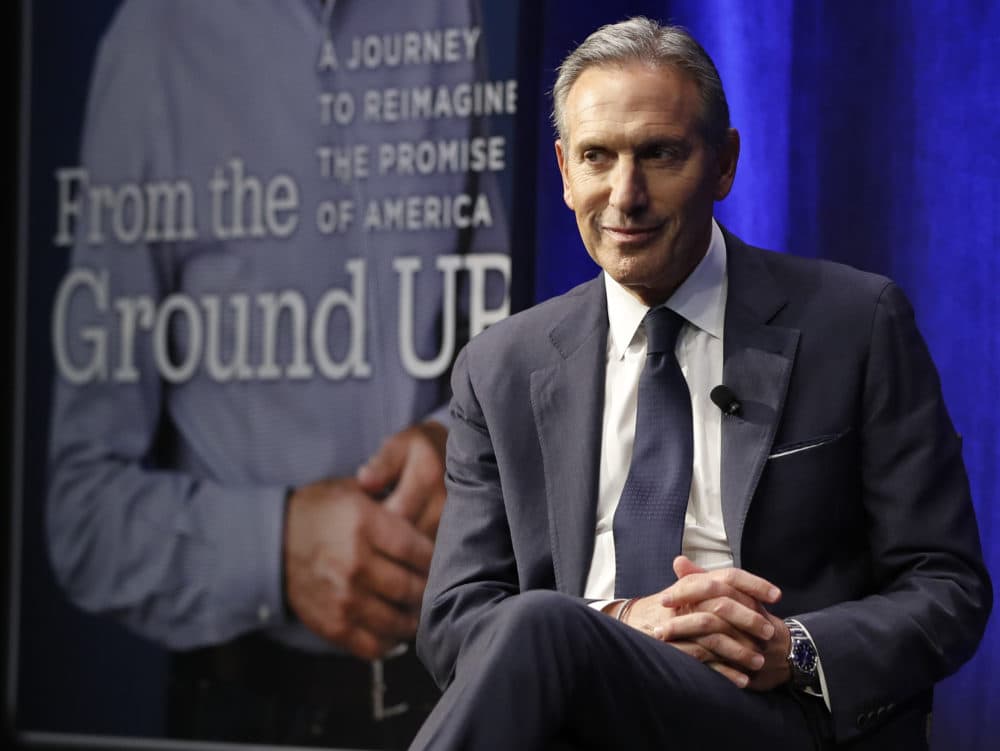Advertisement
Commentary
Howard Schultz And The Myth Of The American Centrist

For a few days, the news of Democrats entering the 2020 presidential field has been forgotten while attention goes to billionaire and former Starbucks CEO Howard Schultz.
Schultz announced Sunday that he is considering entering the race as an independent. It’s early yet, so while he draws the ire of Democrats and of President Trump, now is the time to question Schultz's pitch, not his political chances, because it revives an enduring refrain based on a single persistent viewpoint that shows no sign of fading from American politics.
Schultz has cast himself as the reasonable choice, the one equipped to save the country from parties that are out-of-step with the majority of American voters, who he believes are “centrists” like him.
The problems with this song and dance are about as varied as the options for a drink in one of Schultz’s cafes, and yet they come up as the gold standard for judging candidates in all presidential elections. Among them is that the notion that Americans have a collective definition of what it means to be reasonable, that there is such a thing as a centrist voter and that one well-connected candidate can bring the reasonable centrists to power and save the nation.
These tropes were on display two years ago, from Trump’s declaration, “I alone can fix it,” to Hillary Clinton’s attacks on Bernie Sanders as unreasonable and far from the centrist voting base needed to win an election. As we’ve discovered since that election, one man can’t “fix” most things even if he wants to, people have very different ideas of what is reasonable in America — ranging from white supremacy to universal health care — and the political center is a unicorn that is unnecessary for understanding the important themes that matter to people in American life.
Of course, that’s always been the case. But there has never been a shortage of white, men of intellectual (Ralph Nader) or monetary (Ross Perot) privilege who have claimed that the parties don’t represent what the people want, and who entered into presidential races as third-party candidates. (There have certainly been women "spoilers," too.) Each time, Americans have learned that while political parties are horrible creations that do not reliably represent the best form of democracy, third-party candidates actually dislike them only because their own personal egos (Teddy Roosevelt) are the size of whole political parties in and of themselves.
So why do they keep trying?
The candidacy of someone like Schultz is consistent with someone who has the means to create a narrative and sustain it for themselves, even when it masks a truth that is often worse. Just take a look at how his company has portrayed itself as a good neighbor, championing the causes it wants while conveniently leaving out those that would tarnish its image. In 2017, The New York Times hailed Starbucks’ “stock ownership and free college tuition programs for its workers” and the company’s efforts to hire “people from underserved groups, including veterans and refugees.”
Left out of the story? Issues that are just as relevant to a 2020 presidential campaign, if not more.
As climate change and environmental pollution take center stage, Starbucks produces 1 percent of the world’s 6 billion disposable cups each year. The company only recently committed to sustainable and ethical sourcing for its coffee, and it does it through a $500 million bond that is backed by Morgan Stanley, one of the main companies caught up in the 2008 financial crisis. As for workers’ rights, a unanimous decision by the California Supreme Court found last summer that the company was guilty of failing to pay workers for small daily tasks performed before and after their shifts.
... it seems unlikely that Schultz’s candidacy will gain any traction, but the trouble with his message will endure.
Even if he is good at believing his own press releases, it seems unlikely that Schultz’s candidacy will gain any traction, but the trouble with his message will endure. Like his outsider-predecessors, his refrain empowers a class of political commentators who thrive on what he’s selling, giving them a convenient excuse to vet another generation of candidates on the twin notions of being reasonable and pandering to the center. That allows them to continue to get paid in part to destabilize the viable candidacies of people who, for good reason, are intentionally going beyond what our political class considers reasonable, like Elizabeth Warren and her wealth tax.
It also allows pundits to challenge candidates as though they are doing so in the service of helping find the ones who can reach the mythical political centrists. They do this despite the fact that the entire concept of the center leaves out millions of Americans by underplaying some of the most pressing constitutional issues of our day, including the widespread suppression of voting rights and the growth of gerrymandering.
What people like Schultz misunderstand is that this is a supposed to be a country with a diversity of views about what it means to chart the best course ahead. This was never intended to be a nation where the president “alone can fix it” by conjuring a false idea of unity, especially one that seeks to distract us from the fact that the worst divisions today are stoked by our politicians and rewarded by billionaires like Howard Schultz, who think they’re doing what the reasonable, centrist public they dream of, so desperately needs.

